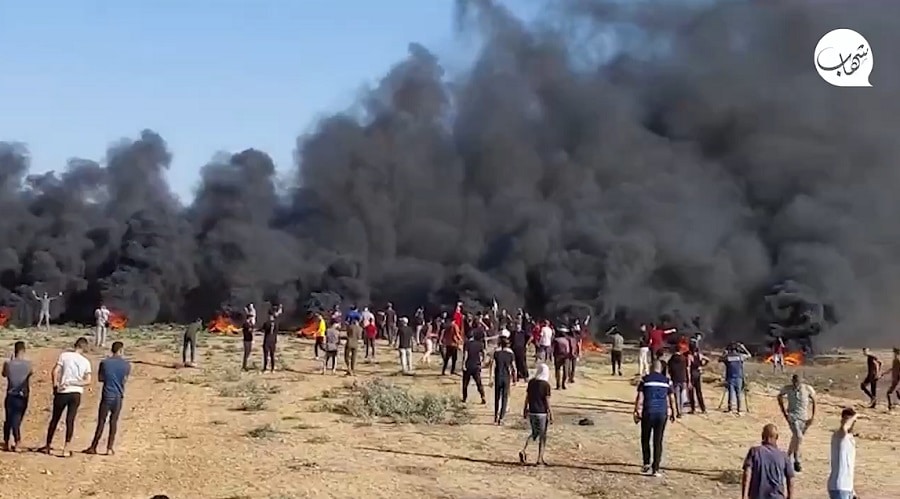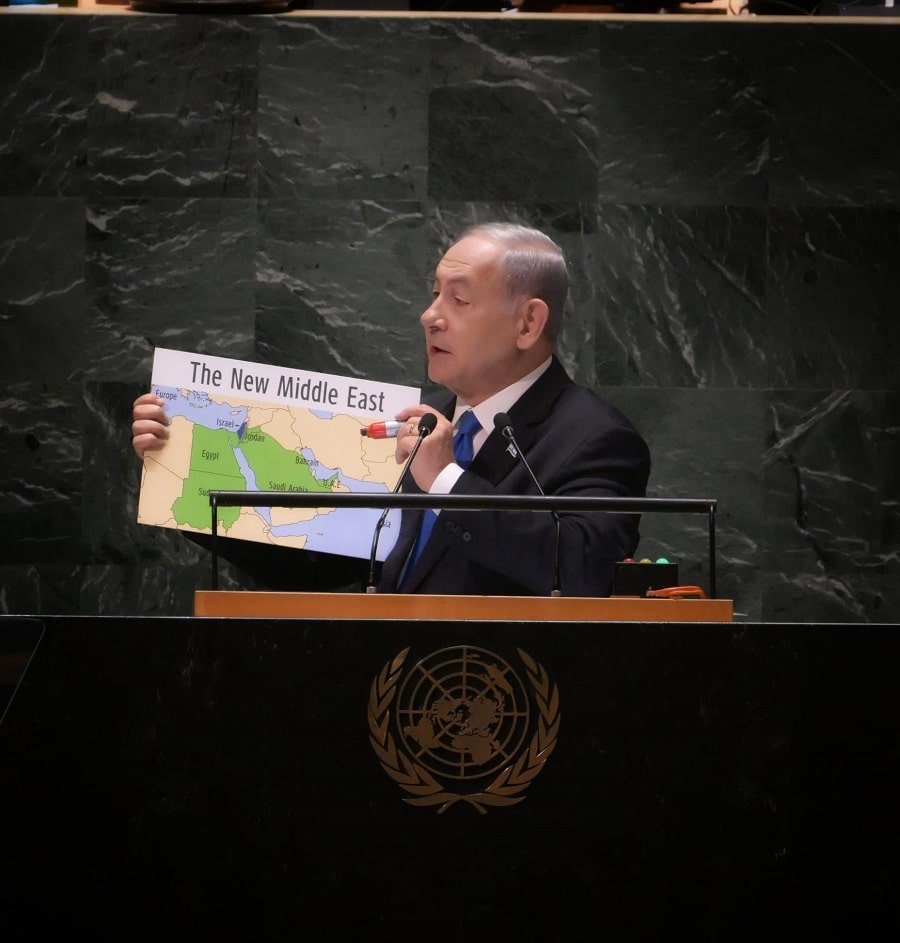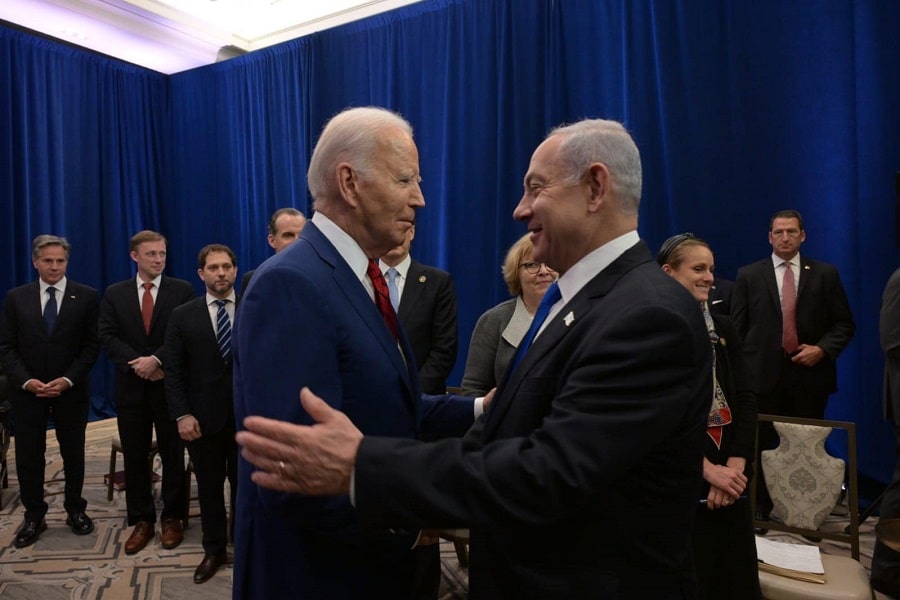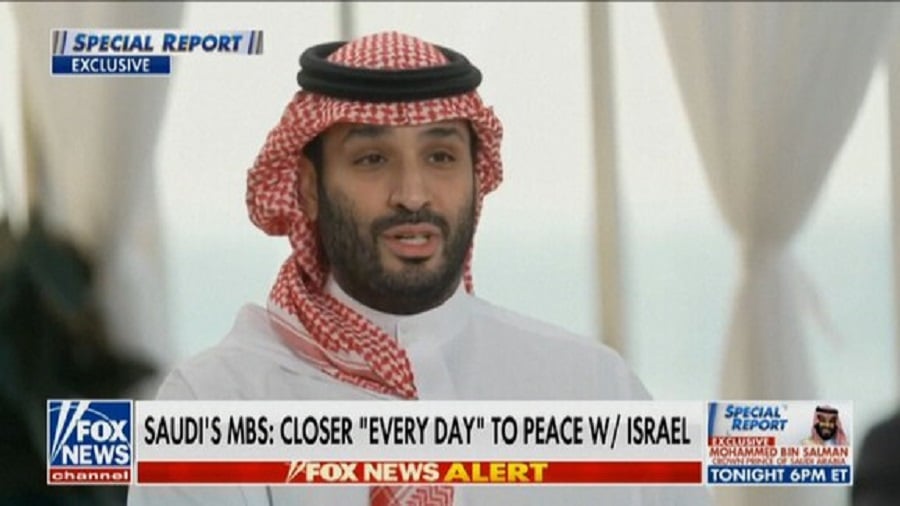Israeli-Saudi normalization takes a significant step forward • Hamas encourages riots on the Israel-Gaza border to pressure Israel and Qatar into concessions • Israel and Germany sign a mega-arms deal, the largest in Israel’s history





Israeli-Saudi normalization efforts: MBS, Netanyahu, and Biden make public statements
- During the second half of September 2023, the prospects of an Israeli-Saudi normalization deal has made significant strides. The Saudi Crown prince openly discussed this issue in public for the first time in an interview to the US media; Israeli Prime Minister Benjamin Netanyahu referred to the emerging deal extensively during his speech to the UN General Assembly; and US President Joe Biden also made comments on the efforts during his meeting with PM Netanyahu.
- Israeli Minister of Tourism Haim Katz made a historic official visit by an Israeli minister to Riyadh, Saudi Arabia to participate in the UN’s World Tourism summit. Israeli Minister of Communications Shlomo Kari and MK David Bitan are also expected to arrive in Saudi during the first week of October.
Mohammed Bin Salman’s interview
- Saudi Arabia’s Crown Prince Mohammed Bin Salman (MBS) held his first interview with a major American news network since 2019, and the first ever in English, where he addressed certain regional topics, including the possibility of normalization with Israel.
- In his interview with Fox News, MBS referred to the emerging Israeli-Saudi normalization agreement and said, “every day we get closer, it seems it’s for the first time really serious. We get to see how it goes”. He insisted his country could work with Israel, no matter who is in charge, calling the deal “the biggest historic deal since the end of the Cold War.”
- MBS also made an unprecedented assertion regarding the Arab and Sunni world’s attitude towards the Palestinians. While in the past, Saudi normalization with Israel was conditioned upon significant Israeli territorial and security concessions to the Palestinian Authority, most prominently shaped in the 2002 Saudi Peace Plan, the same Saudi Arabia now holds the positions that it is sufficient to “improve the lives of Palestinians, in order to get closer to Israel. MBS’ rhetoric and lack of specific preconditions on this front confirms the major shift in the Sunni world over the past decade as it relates to the Palestinian issue, which now seems less of an obstacle to overcome to achieve normalization, rather than a means to pressure Israel to benefit the Palestinians. When asked about the potential for Iran to obtain a nuclear weapon and what it would mean for Saudi Arabia, the crown prince clearly stated that should Iran obtain such a weapon, Saudi Arabia would “have to get one, for security reasons, for balancing power.” He added that there is no benefit in merely having nuclear weapons because they cannot be used. “Any country that uses a nuclear weapon means that they are having a war with the rest of the world,” he added, and noted that “any country that uses nuclear weapons will be at war with all the countries of the world.”
PM Netanyahu’s speech at the UNGA
- Israel’s Prime Minister, Benjamin Netanyahu, addressed the 78th session of the United Nations General Assembly as part of the annual General Debate. His speech revolved around two critical themes: the potential for a groundbreaking peace accord with Saudi Arabia and the imminent threat posed by Iran. “Israel is on the verge of creating a peace with Saudi Arabia that could transform the Middle East as long as Iran’s nuclear threat is eliminated’, said Netanyahu. He added that the region is “at the cusp” of a “dramatic breakthrough: a historic peace with Saudi Arabia”. He continued, “Such a peace will go a long way to ending the Arab-Israeli conflict. It will encourage other Arab states to normalize relations with Israel. It will enhance the prospects of peace with the Palestinians”.
- Netanyahu added that the Palestinians should not have a veto over a peace process with Arab states. “When the Palestinians see that most of the Arab world has reconciled itself to the Jewish state, they too will be more likely to abandon the fantasy of destroying Israel and finally embrace a path of genuine peace with it”.
- On Iran, Netanyahu warned that it would “do everything they can to thwart this historic peace,” highlighting the regime’s global threats, nuclear program, repression of its own people and proliferation of weapons throughout the region and world. “Yet the regime’s aggression is largely met by indifference from the international community,” calling for the international community to reimpose sanctions on Iran. He pledged that “As long as I am prime minister of Israel, I will do everything in my power to prevent Iran from getting nuclear weapons.”
President Biden and PM Netantahu hold a meeting
- Israeli Prime Minister, Benjamin Netanyahu, met with US President, Joe Biden, in New York for the first time since the two came into office, in a meeting where the two discussed key issues such as the normalization agreement that is taking shape with Saudi Arabia, the Iranian nuclear issue, and the Palestinian issue.
- Both sides expressed their desire to overcome the obstacles to advancing the normalization agreement with Saudi Arabia and to do so jointly. President Biden said at the beginning of the meeting: “75 years ago, Ben-Gurion spoke of Israel as the “dream of the generations”. Since then, we have stood side by side. Recently, for example, in the India-Saudi-Israel-Europe economic corridor.”
- Prime Minister Netanyahu said in response: “I believe that under your leadership, it is possible to reach an unprecedented agreement with Saudi Arabia and to resolve the disputes with the Arab world. “I believe that under your watch, Mr. President, historic peace can be achieved.”
- Biden also referenced other “hard issues” the two would discuss, including preserving the path to a two-state solution, and “ensuring that Iran never, never, acquires a nuclear weapon.”
- Netanyahu praised Biden’s efforts to prevent Iran from obtaining a nuclear weapon.
- The prime minister added: “That shared goal of ours can be achieved by a credible military threat, crippling sanctions and supporting the brave men and women of Iran who despise that regime and who are our real partners for a better future.”
- The White House said that Biden invited Netanyahu to visit the White House before the end of this year. The White House also addressed the growing tensions in Judea and Samaria: “President Biden emphasized the need for immediate actions that would improve Israel’s security and economic situation and preserve the possibility of a two-state solution, which would lead to long-term peace with the Palestinians.



Normalization deal with Saudi Arabia – analysis, opportunities and challenges
- Reaching a normalization agreement between Israel and Saudi Arabia entails various opportunities and challenges for Israel, Saudi Arabia, and the US as well as the region. It bears the potential of opening a new chapter in the conflict between Judaism and Islam, and marks an era of pragmatism, rather than idealism in Middle East politics.
- One of the main challenges is the expected Iranian response. Relations between Saudi Arabia and Israel could spark anger in Iran, especially in light of the Saudi-Iranian MoU signed last March. The Saudis understand that they must walk on eggshells in the coming period, yet once signed, an Israeli-Saudi deal could trigger a severe crisis with Iran. Mainly due to the Iranian threat, Saudi Arabia demands US security guarantees, which according to reports could take the form of a defense alliance with the US. Some reports also relate to the issue of a Saudi nuclear program in one shape or another, a topic that requires Israel’s reference and political attention.
- On the other hand, Iran’s progress towards a military nuclear weapon and its aggression throughout the Middle East have been the catalyst for a normalization agreement between Israel and Saudi Arabia. Saudi Arabia understands that Israel is the only country that exerts force against Iranian aggression, and especially against its nuclear program.
- In addition, normalization with Israel can entail major advantages for Saudi Arabia in regard to cooperation in civil fields, such as cyber, technology, water, and trade.
- Saudi Arabia also has a clear interest in putting its relations with the United States back on track. Normalization with Israel will strengthen its position in Washington and its relations with the American administration. Bin Salman sees Israel as a means to assist Saudi Arabia in lifting the American embargo on the sale of advanced weapons systems to Saudi Arabia, especially in light of Iran’s rapidly advancing military nuclear program.
- For Israel’s part, a normalization agreement with Saudi Arabia can mark the end of the Israeli-Arab conflict, by virtue of Saudi Arabia’s position as the leader of the Sunni world, its inter-Arab and regional position. Such an agreement will potentially lead to “6-7 more agreements” with other Arab and Muslim countries, as per Israeli Foreign Minister Eli Cohen, and could significantly play down the centrality of the Israeli-Palestinian issue in Israel’s foreign policy.
Gazan border riots: Hamas attempting to reinstate its influence
- Gazan rioters re-sparked confrontations with IDF soldiers on the Israel-Gaza border during September, which lasted for almost two weeks. These included the launching of explosive balloons, which caused severe fires in Israeli agricultural fields; setting IDF posts on fire along the border; throwing rocks and setting tires on fire. In response, the Israeli Air Force carried out strikes against Hamas posts in Rafah and around the Gaza strip. Israel later closed off the Erez Crossing for Gazan workers, which bore a heavy toll on the Gazan economy with 18,500 workers commuting from Gaza into Israel on a daily basis. Some sources say each day of closure bears the cost of more than 10 million NIS (some $2.6 million USD) on the Gazan economy.
- While many reports merely blamed Israel for the riots while failing to address the genuine and political causes surrounding them., the Hamas leadership was hoping to pressure Israel into concessions following Qatar’s decision to downgrade its financial support of the organization. Qatar which had been funneling some $30 million USD monthly to Gaza in financial assistance, is furious over Hamas’ rapprochement with the Assad regime and their increased affiliation with the Iranian axis among other reasons.
- In practice, Qatar’s steady financial aid to Hamas in Gaza has seen a decline in recent months. Of the original $30 million USD, $7-10 million allocated to paying the wages of Hamas officials were reduced to $3 million, cutting wages in half to around 1,700 NIS (around $445). Additionally, $10 million are allocated to providing assistance to families under the poverty lines, a total of $100 to each of the 100,000 families. These aid funds are now heavily taxed by Hamas. Finally, $10 million are allocated for the purchasing of fuel for the Gaza power station, an amount which now has also been cut back.
- Since 2014, Qatar invested more than $1 billion USD in the reconstruction of Gaza and stabilizing the Hamas leadership there.
- On September 28, the “Rebel Youth” in Gaza announced to Hamas that they were ceasing the riots on the border, after reports that Israel agreed to increase the quota of workers allowed to enter Israel from Gaza, and that Qatar agreed to bring the Hamas functionaries budget back to the original $10 million. Israel denied that report, while re-opening the Erez Crossing for the same number of workers.
Assad’s visit to China
For the first time in 20 years, Syrian President Bashar al-Assad made a visit to China. It seems that Assad is attempting to break the international isolation against his regime and is turning to the Chinese to help rebuild Syria after the war. For China’s part, this visit joins its attempts to present itself as an influential and important country for the Middle East. This way, Beijing can demonstrate its diplomatic strength on the one hand, and promote its grandiose plan, the “New Silk Road” on the other, which relies heavily on the Middle East. It should be noted that relations between Syria and China remained stable even during the Syrian Civil War, and Assad’s regional and international isolation due to his use of chemical weapons against civilians. Attempting an end-run around Western sanctions, Assad is attempting to re-legitimize his regime on the world stage alongside consolidating his control over the country.
The IDF completes the identification of a missing soldier’s body from the 1948 War of Independence
- The IDF has announced its formal identification of the body of Chaplain Dov Broder, who fell during the “Medina” operation during the 1948 War of Independence and has since been missing. The IDF Branch for the Location of Missing Soldiers has been conducting an investigation since 2006 of an unmarked grave in a Petah Tikvah cemetery, and with various means has established the body belongs to Broder. Among other means they used relevant documents, anthropological exams and testimonies from the battlefield. An IDF representative delivered the news to Broder’s 95-year-old widow.

